Donald Trump may be a world of chaos all by himself, but the world beyond Trump is changing in dramatic ways, often with little notice. We’d like to tell you about it and we’re keeping track of these global changes, from the incremental to the monumental, so that you don’t have to.Sign up for our weekly newsletter of the biggest news in the world delivered to your inbox every Sunday.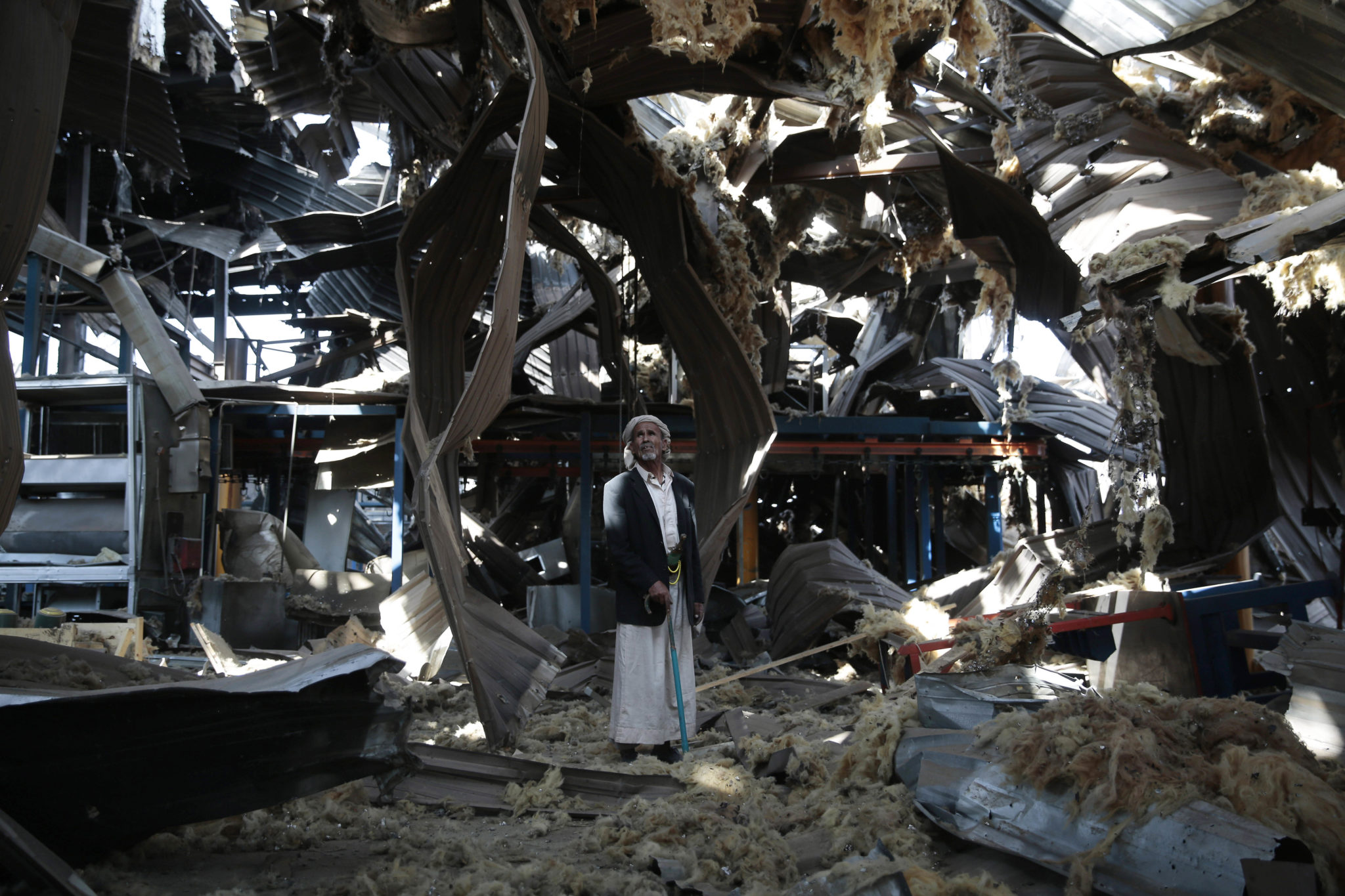 The United Nations agreed Friday to launch an independent investigation into alleged war crimes and human rights abuses in Yemen’s civil war. The announcement follows mounting pressure from activists, lawmakers, and international human rights organizations who’ve long accused both sides of war crimes in the nearly 3-year war.Saudi Arabia, whose coalition forces are responsible for the war’s overwhelming majority of civilian casualties, impeded independent investigations for years, regularly relying on U.S. support in the U.N. to block such efforts.But the Kingdom finally gave in Friday after the Netherlands and Canada accepted its amended resolution, which avoided an international independent Commission of Inquiry, but still allowed for an independent group of experts to investigate possible war crimes.Those experts will have a year to uncover abuses and violations that have occurred throughout the conflict.“By passing this resolution today, the Human Rights Council has finally responded to the repeated calls of the High Commissioner for Human Rights and national and international rights groups to establish an investigative mechanism into violations of international law in Yemen,” Anna Neistat, Amnesty International’s Senior Director for Research said in a statement.The conflict in Yemen has spurred what the U.N. says is one of the worst humanitarian crises in the world.— Alexa Liautaud
The United Nations agreed Friday to launch an independent investigation into alleged war crimes and human rights abuses in Yemen’s civil war. The announcement follows mounting pressure from activists, lawmakers, and international human rights organizations who’ve long accused both sides of war crimes in the nearly 3-year war.Saudi Arabia, whose coalition forces are responsible for the war’s overwhelming majority of civilian casualties, impeded independent investigations for years, regularly relying on U.S. support in the U.N. to block such efforts.But the Kingdom finally gave in Friday after the Netherlands and Canada accepted its amended resolution, which avoided an international independent Commission of Inquiry, but still allowed for an independent group of experts to investigate possible war crimes.Those experts will have a year to uncover abuses and violations that have occurred throughout the conflict.“By passing this resolution today, the Human Rights Council has finally responded to the repeated calls of the High Commissioner for Human Rights and national and international rights groups to establish an investigative mechanism into violations of international law in Yemen,” Anna Neistat, Amnesty International’s Senior Director for Research said in a statement.The conflict in Yemen has spurred what the U.N. says is one of the worst humanitarian crises in the world.— Alexa Liautaud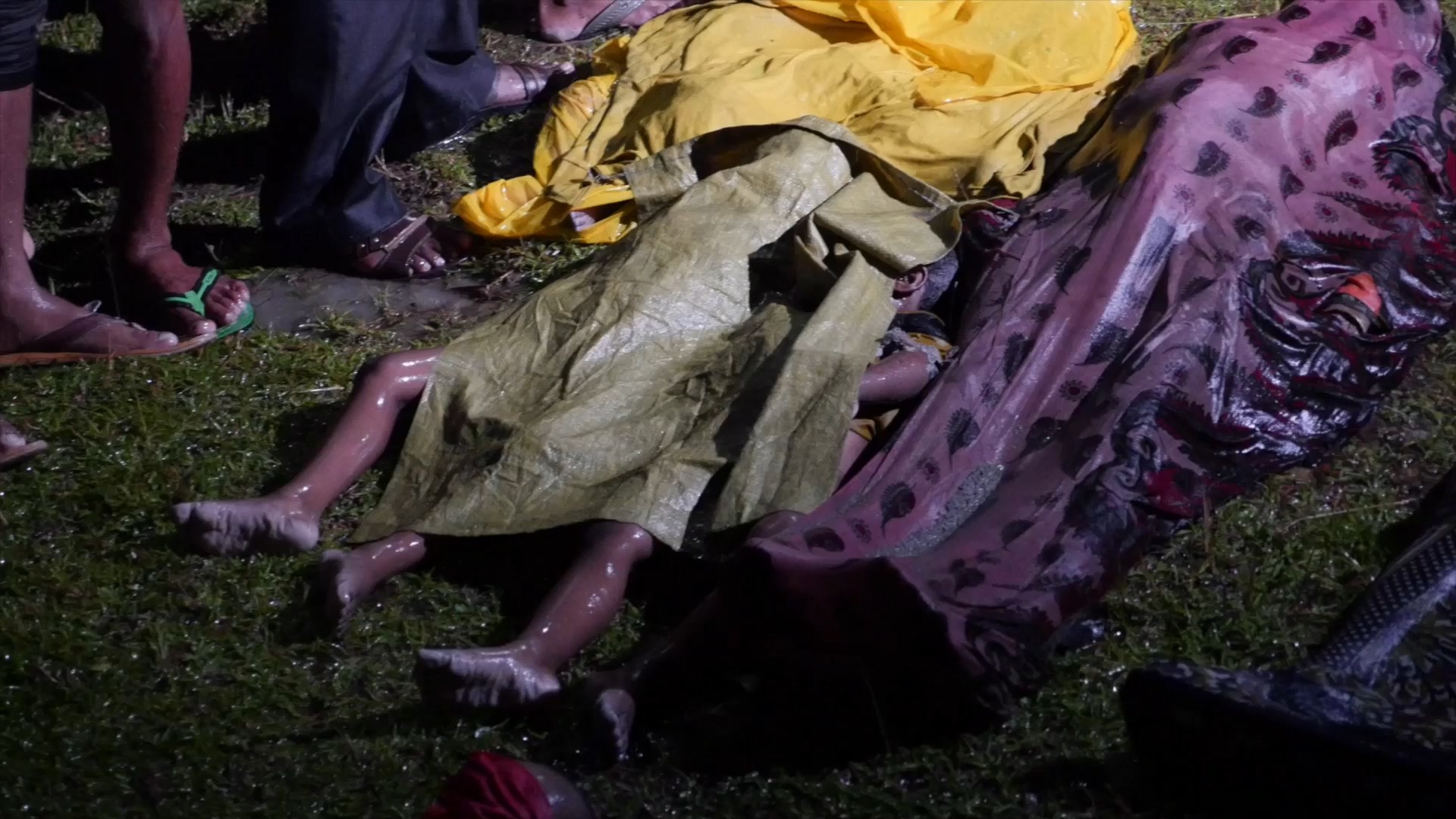 Updated with latest information: 4:00 p.m. EST September 29, 2017Twenty-three Rohingya women and children fleeing widespread violence in Myanmar’s Rakhine state drowned Thursday when their boat capsized off the coast of Bangladesh.The survivors told the AFP that the boat had collided with an object close to the shore and then overturned.Over 100 Rohingya Muslims have already drowned attempting to reach dry land, according to estimates by police in Bangladesh, escaping the brutal military crackdown that has already taken hundreds of lives. But the small fishing boats they’re traveling in are no match for the Bay of Bengal.Read more: A Rohingya refugee recalls her escape from MyanmarThe incident comes as the United Nations announced Thursday that 500,000 Rohingya Muslims have fled Myanmar since August, when Myanmar’s security forces unleashed a ruthless crackdown on the ethnic minority group.“It is the largest mass refugee movement in the region in decades,” said U.N. deputy spokesperson Farhan Haq, according to the Associated Press.Bangladesh has borne the brunt of Myanmar’s crisis, which the U.N. says has all the trademarks of “textbook” ethnic cleansing. Myanmar’s army, along with local Buddhist mobs, has implemented a sustained, severe, and indiscriminate crackdown on the minority population since August.The Office of the United Nations High Commissioner for Refugees called for the redoubling of emergency funds as the populations in the refugee camps in Bangladesh have soared.— Alexa Liautaud Read more: Myanmar’s bloody purge of Rohingya has created an islamist insurgency
Updated with latest information: 4:00 p.m. EST September 29, 2017Twenty-three Rohingya women and children fleeing widespread violence in Myanmar’s Rakhine state drowned Thursday when their boat capsized off the coast of Bangladesh.The survivors told the AFP that the boat had collided with an object close to the shore and then overturned.Over 100 Rohingya Muslims have already drowned attempting to reach dry land, according to estimates by police in Bangladesh, escaping the brutal military crackdown that has already taken hundreds of lives. But the small fishing boats they’re traveling in are no match for the Bay of Bengal.Read more: A Rohingya refugee recalls her escape from MyanmarThe incident comes as the United Nations announced Thursday that 500,000 Rohingya Muslims have fled Myanmar since August, when Myanmar’s security forces unleashed a ruthless crackdown on the ethnic minority group.“It is the largest mass refugee movement in the region in decades,” said U.N. deputy spokesperson Farhan Haq, according to the Associated Press.Bangladesh has borne the brunt of Myanmar’s crisis, which the U.N. says has all the trademarks of “textbook” ethnic cleansing. Myanmar’s army, along with local Buddhist mobs, has implemented a sustained, severe, and indiscriminate crackdown on the minority population since August.The Office of the United Nations High Commissioner for Refugees called for the redoubling of emergency funds as the populations in the refugee camps in Bangladesh have soared.— Alexa Liautaud Read more: Myanmar’s bloody purge of Rohingya has created an islamist insurgency Israel’s ongoing campaign to stop Palestine joining international organizations suffered another blow Wednesday when intergovernmental police organization Interpol accepted their neighbor as a full member.Israel argues that Palestine is not a state and should therefore not be allowed to join international bodies.Interpol said Palestine’s membership was approved in a secret vote at its annual general meeting, passing by 75 to 24 votes, with 34 abstentions.“This victory was made possible because of the principled position of the majority of Interpol members,” Palestinian Foreign Minister Riyad al-Maliki said.Israeli Prime Minister Benjamin Netanyahu warned the Palestinian “diplomatic offensive will not go unanswered.”Israel successfully thwarted Palestine’s bid for Interpol membership at last year’s meeting.The Jewish state has lobbied against Palestine’s efforts to gain recognition from international institutions, which it pursues to help bolster its claim of statehood.Since Palestine gained observer status at the United Nations in 2012, it has joined more than 50 international organizations.Netanyahu said in a statement that by joining Interpol, the Palestinians were in breach of deals they had made with Israel.He said he had discussed the Interpol issue, along with the Palestinian leadership’s failure to condemn a deadly attack that killed three Israelis Tuesday, with Washington’s Middle East envoy Jason Greenblatt.“The actions of the Palestinian leadership in the past few days directly harm the prospects of achieving peace,” he said.– Tim Hume
Israel’s ongoing campaign to stop Palestine joining international organizations suffered another blow Wednesday when intergovernmental police organization Interpol accepted their neighbor as a full member.Israel argues that Palestine is not a state and should therefore not be allowed to join international bodies.Interpol said Palestine’s membership was approved in a secret vote at its annual general meeting, passing by 75 to 24 votes, with 34 abstentions.“This victory was made possible because of the principled position of the majority of Interpol members,” Palestinian Foreign Minister Riyad al-Maliki said.Israeli Prime Minister Benjamin Netanyahu warned the Palestinian “diplomatic offensive will not go unanswered.”Israel successfully thwarted Palestine’s bid for Interpol membership at last year’s meeting.The Jewish state has lobbied against Palestine’s efforts to gain recognition from international institutions, which it pursues to help bolster its claim of statehood.Since Palestine gained observer status at the United Nations in 2012, it has joined more than 50 international organizations.Netanyahu said in a statement that by joining Interpol, the Palestinians were in breach of deals they had made with Israel.He said he had discussed the Interpol issue, along with the Palestinian leadership’s failure to condemn a deadly attack that killed three Israelis Tuesday, with Washington’s Middle East envoy Jason Greenblatt.“The actions of the Palestinian leadership in the past few days directly harm the prospects of achieving peace,” he said.– Tim Hume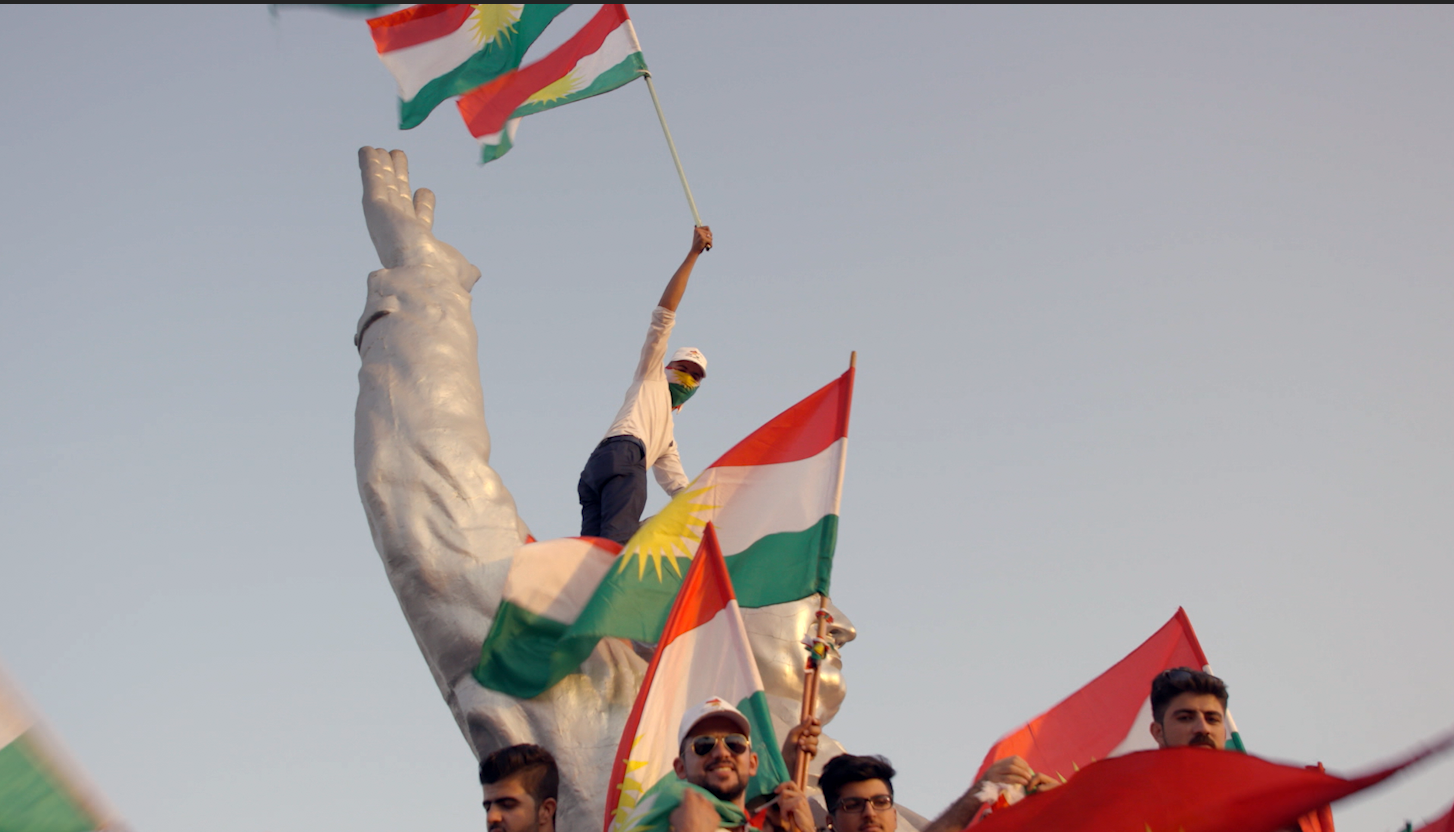 Iraqi Kurdish leader Masoud Barzani declared victory Tuesday, saying that an overwhelming majority of Iraqi Kurds had voted in favor of independence in Monday’s controversial referendum. But Barzani’s jubilant tone did little to quell the rage emanating from Baghdad and its neighbors, who vehemently oppose the independence effort.In a televised address, Barzani said that 92 percent voted “yes” in northern Iraq’s Kurdish proto-state, and that Iraq’s president Haider al-Abadi should prepare to negotiate accordingly.“Instead of harassment, let’s have dialogue for a better future,” Barzani said.”Negotiations are the right path to solve the problems, not threats or the language of force.”Iraq along with Turkey and Iran threatened sanctions against the Kurds Tuesday, if Barzani moved with his demands.Turkey and Iran fear Monday’s vote could inspire uprisings from their own Kurdish minorities, while western powers such as the U.S. and the U.K. have warned that the independence effort risks further destabilizing a region battling still at war with ISIS.President Recep Tayyip Erdoğan called the vote “treachery,” and said Turkey may impose a blockade to force the Kurds “give up on this adventure that can only have a dark end.” Before the vote, Erdoğan threatened Iraq’s Kurdish region with military action.“It will be over when we close the oil taps, all [their] revenues will vanish, and they will not be able to find food when our trucks stop going to northern Iraq,” he added.The official results of Monday’s referendum will be made public Wednesday, according to Reuters.— Alexa LiautaudRead more: Erdoğan threatens military action over Iraqi Kurds’ independence vote
Iraqi Kurdish leader Masoud Barzani declared victory Tuesday, saying that an overwhelming majority of Iraqi Kurds had voted in favor of independence in Monday’s controversial referendum. But Barzani’s jubilant tone did little to quell the rage emanating from Baghdad and its neighbors, who vehemently oppose the independence effort.In a televised address, Barzani said that 92 percent voted “yes” in northern Iraq’s Kurdish proto-state, and that Iraq’s president Haider al-Abadi should prepare to negotiate accordingly.“Instead of harassment, let’s have dialogue for a better future,” Barzani said.”Negotiations are the right path to solve the problems, not threats or the language of force.”Iraq along with Turkey and Iran threatened sanctions against the Kurds Tuesday, if Barzani moved with his demands.Turkey and Iran fear Monday’s vote could inspire uprisings from their own Kurdish minorities, while western powers such as the U.S. and the U.K. have warned that the independence effort risks further destabilizing a region battling still at war with ISIS.President Recep Tayyip Erdoğan called the vote “treachery,” and said Turkey may impose a blockade to force the Kurds “give up on this adventure that can only have a dark end.” Before the vote, Erdoğan threatened Iraq’s Kurdish region with military action.“It will be over when we close the oil taps, all [their] revenues will vanish, and they will not be able to find food when our trucks stop going to northern Iraq,” he added.The official results of Monday’s referendum will be made public Wednesday, according to Reuters.— Alexa LiautaudRead more: Erdoğan threatens military action over Iraqi Kurds’ independence vote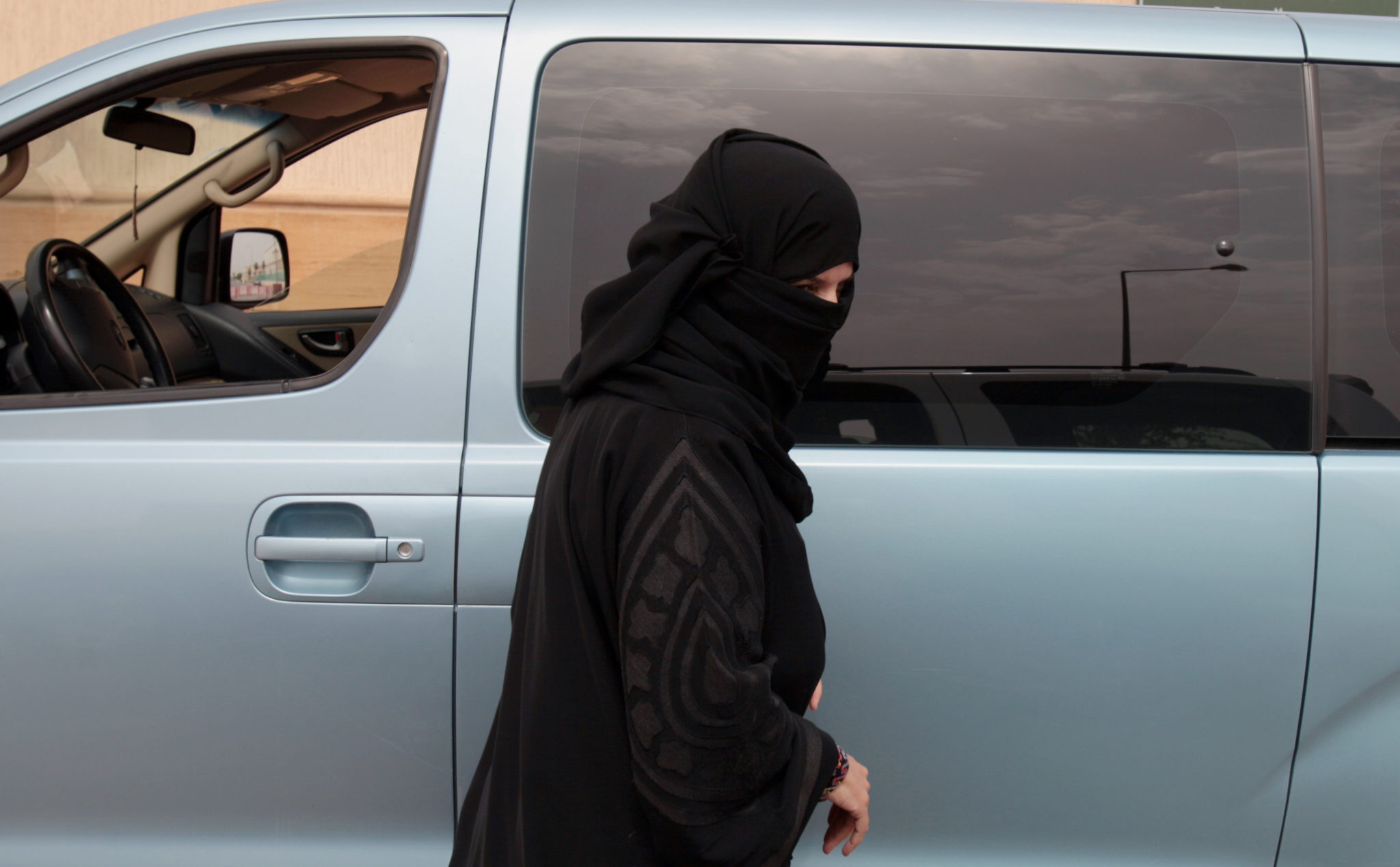 Saudi Arabia will soon allow women to drive, King Salman decreed Tuesday, in a move that ends the kingdom’s reign as the only country in the world that forbids women from obtaining their driver’s licenses.The long-standing ban has been deeply unpopular abroad and is often pointed to as proof of Saudi Arabia’s repressive rule. Saudi Arabia has long-weathered widespread criticism for its human rights record. The kingdom’s imprisonment of women who dare to drive has ranked high among its critics’ list of complaints.That pressure appears to have paid off, at least a little.“Many international actors put out statements and organized and applied pressure on the Saudi government to support this Saudi-women led movement,” explained Raed Jarrar, Amnesty International’s advocacy director for Middle East and North Africa. But, he added, the fact that the international community is celebrating Saudi women being able to drive in 2017 reveals the poor state of human rights in Saudi Arabia.The ban won’t be lifted immediately. According to the decree, a ministerial committee will have 30 days to come up with recommendations about issues that must be addressed before women can take the wheel. And it’s not yet clear whether women will have to ask their male guardians for permission to drive. Women must legally secure their permission before attending getting a passport, traveling abroad, or getting married.Ahmed Benchemsi, who handles communications and advocacy for Middle East and north Africa for Human Rights Watch, said these requirements also need to be demolished.“The battle [is] not over,” Benchemsi told VICE News. “It’s a step that we welcome, and that is obviously to the credit of these brave women who have campaigned for it for a long time, but it’s just a step. Much more needs to be done.”If all goes according to plan, Saudi women will be driving by June 24, 2018.— Carter Sherman
Saudi Arabia will soon allow women to drive, King Salman decreed Tuesday, in a move that ends the kingdom’s reign as the only country in the world that forbids women from obtaining their driver’s licenses.The long-standing ban has been deeply unpopular abroad and is often pointed to as proof of Saudi Arabia’s repressive rule. Saudi Arabia has long-weathered widespread criticism for its human rights record. The kingdom’s imprisonment of women who dare to drive has ranked high among its critics’ list of complaints.That pressure appears to have paid off, at least a little.“Many international actors put out statements and organized and applied pressure on the Saudi government to support this Saudi-women led movement,” explained Raed Jarrar, Amnesty International’s advocacy director for Middle East and North Africa. But, he added, the fact that the international community is celebrating Saudi women being able to drive in 2017 reveals the poor state of human rights in Saudi Arabia.The ban won’t be lifted immediately. According to the decree, a ministerial committee will have 30 days to come up with recommendations about issues that must be addressed before women can take the wheel. And it’s not yet clear whether women will have to ask their male guardians for permission to drive. Women must legally secure their permission before attending getting a passport, traveling abroad, or getting married.Ahmed Benchemsi, who handles communications and advocacy for Middle East and north Africa for Human Rights Watch, said these requirements also need to be demolished.“The battle [is] not over,” Benchemsi told VICE News. “It’s a step that we welcome, and that is obviously to the credit of these brave women who have campaigned for it for a long time, but it’s just a step. Much more needs to be done.”If all goes according to plan, Saudi women will be driving by June 24, 2018.— Carter Sherman Ireland will hold a referendum on whether the county should repeal its ban on abortion in almost all circumstances in 2018, the Irish government announced Tuesday. The vote will take place in either May or June, weeks before Pope Francis visits the heavily Catholic country.The move follows increased pressure from abortion rights activists who have championed an effort to “Repeal the 8th,” a reference to the 1983 constitutional amendment that bans abortion.Nearly 4,000 women leave Ireland each year to get an abortion. The Republic of Ireland’s constitution currently criminalizes the procedure except when the mother’s life is at risk. Women who seek abortions face spending 14 years in prison, while healthcare providers who refer women to get abortions abroad can be fined up to 4,000 euros, according to Amnesty International. And independent experts working on behalf of the United Nations found that Ireland’s ban led women to endure “discrimination and cruel, inhuman or degrading treatment.”Ireland’s prime minister, Leo Varadkar, has previously welcomed anti-abortion politicians into his party, though he doesn’t personally support the eighth amendment.“I come at it both as a politician and as a doctor but also as a brother and an uncle,” Varadkar said in May, while he was still serving as Ireland’s minister for social protection. “I don’t agree with abortion on request but I also am very sure the Eighth Amendment is too restrictive.”Abortion is also criminalized in Northern Ireland, though the rest of the U.K. permits it.— Carter Sherman
Ireland will hold a referendum on whether the county should repeal its ban on abortion in almost all circumstances in 2018, the Irish government announced Tuesday. The vote will take place in either May or June, weeks before Pope Francis visits the heavily Catholic country.The move follows increased pressure from abortion rights activists who have championed an effort to “Repeal the 8th,” a reference to the 1983 constitutional amendment that bans abortion.Nearly 4,000 women leave Ireland each year to get an abortion. The Republic of Ireland’s constitution currently criminalizes the procedure except when the mother’s life is at risk. Women who seek abortions face spending 14 years in prison, while healthcare providers who refer women to get abortions abroad can be fined up to 4,000 euros, according to Amnesty International. And independent experts working on behalf of the United Nations found that Ireland’s ban led women to endure “discrimination and cruel, inhuman or degrading treatment.”Ireland’s prime minister, Leo Varadkar, has previously welcomed anti-abortion politicians into his party, though he doesn’t personally support the eighth amendment.“I come at it both as a politician and as a doctor but also as a brother and an uncle,” Varadkar said in May, while he was still serving as Ireland’s minister for social protection. “I don’t agree with abortion on request but I also am very sure the Eighth Amendment is too restrictive.”Abortion is also criminalized in Northern Ireland, though the rest of the U.K. permits it.— Carter Sherman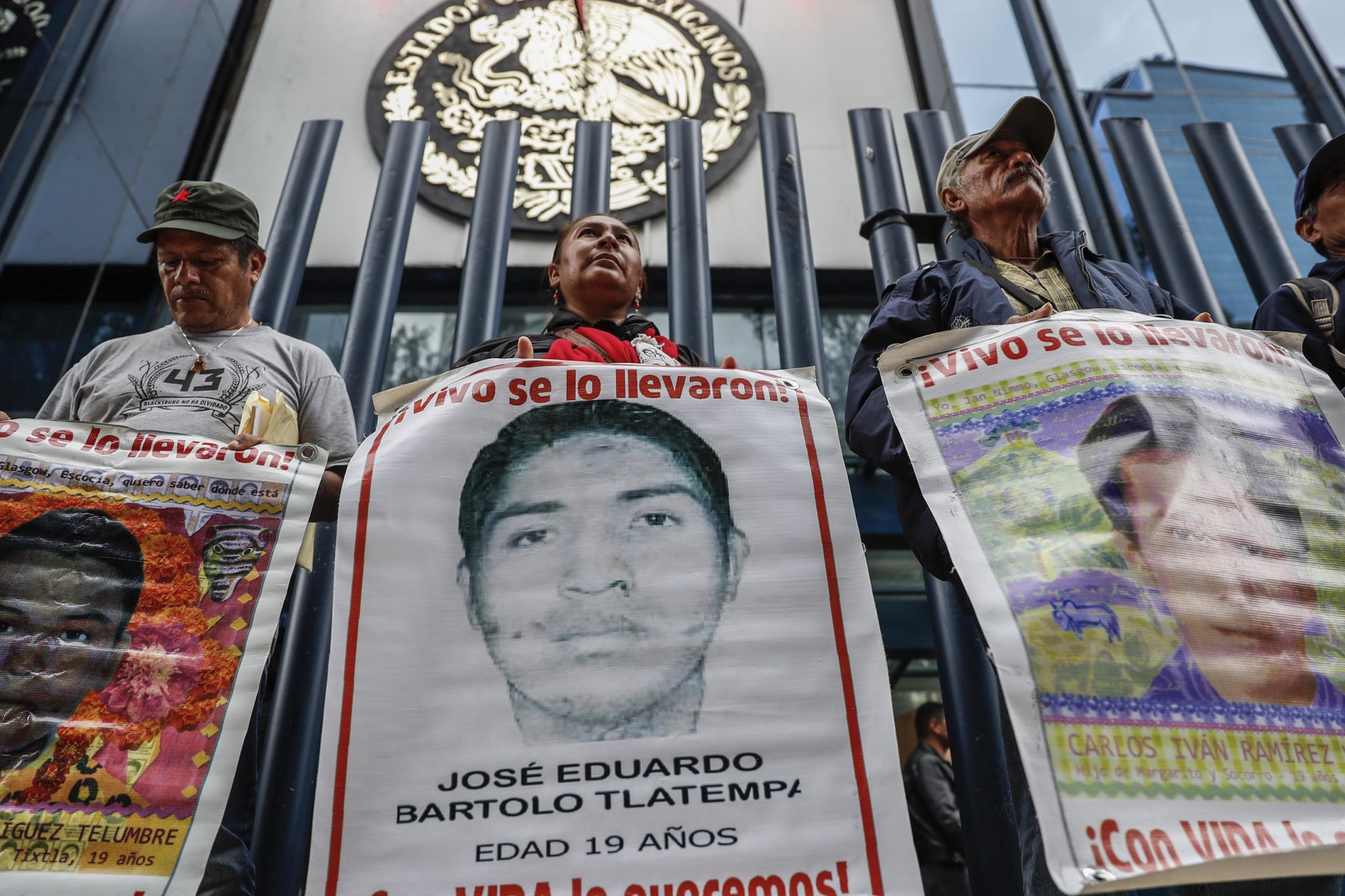 GUADALAJARA, Mexico — Mario González hoped the Ayotzinapa teacher training college in southern Guerrero state would provide his 22-year-old son César with a pathway out of poverty. But César was robbed of any future when police officers forcefully disappeared him and 42 male classmates on a hellish September night three years ago in the town of Iguala.Alerted to the incident by one of César’s friends, Gónzalez, a 52-year-old welder from central Tlaxcala state, arrived in Iguala the next morning, but it was too late. The missing students had last been seen packed in patrol cars after a series of ambushes in which police killed six civilians and wounded dozens more.Three years after the attacks, González is still trying to find his son and bring the culprits to justice. But the Mexican government’s widely discredited investigation has stalled, leaving unanswered questions over the level of state involvement in the crime, and robbing parents and survivors of any sense of closure.Forced disappearances are not uncommon in Mexico, where over 32,000 people are currently missing, but Ayotzinapa captured the public’s attention more than any other due to the brutal, calculated manner in which the students were vanished, and the government’s inability to find them.“All 43 families still feel the same pain as if our children had been taken from us yesterday,” González says. “We’re still determined to search for them, find them, and embrace them.”The case and its endless array of inexplicable holes, false confessions, and inconsistencies has pushed parents like González into a world of sleuthing and conspiracy theorizing. Their search received some help this month from British research group Forensic Architecture, which published a digital platform that maps 5,000 data points and allows users to explore an interactive timeline of the attacks on the students. Based on independent investigations, the platform illustrates the highly coordinated nature of the attacks, involving local and federal police officers.— Duncan TuckerRead more: Parents of Mexico’s 43 missing students take matters into their own hands
GUADALAJARA, Mexico — Mario González hoped the Ayotzinapa teacher training college in southern Guerrero state would provide his 22-year-old son César with a pathway out of poverty. But César was robbed of any future when police officers forcefully disappeared him and 42 male classmates on a hellish September night three years ago in the town of Iguala.Alerted to the incident by one of César’s friends, Gónzalez, a 52-year-old welder from central Tlaxcala state, arrived in Iguala the next morning, but it was too late. The missing students had last been seen packed in patrol cars after a series of ambushes in which police killed six civilians and wounded dozens more.Three years after the attacks, González is still trying to find his son and bring the culprits to justice. But the Mexican government’s widely discredited investigation has stalled, leaving unanswered questions over the level of state involvement in the crime, and robbing parents and survivors of any sense of closure.Forced disappearances are not uncommon in Mexico, where over 32,000 people are currently missing, but Ayotzinapa captured the public’s attention more than any other due to the brutal, calculated manner in which the students were vanished, and the government’s inability to find them.“All 43 families still feel the same pain as if our children had been taken from us yesterday,” González says. “We’re still determined to search for them, find them, and embrace them.”The case and its endless array of inexplicable holes, false confessions, and inconsistencies has pushed parents like González into a world of sleuthing and conspiracy theorizing. Their search received some help this month from British research group Forensic Architecture, which published a digital platform that maps 5,000 data points and allows users to explore an interactive timeline of the attacks on the students. Based on independent investigations, the platform illustrates the highly coordinated nature of the attacks, involving local and federal police officers.— Duncan TuckerRead more: Parents of Mexico’s 43 missing students take matters into their own hands The Brazilian government’s decision to reverse a decree that allowed mining in the Amazon rainforest was hailed by environmentalists Monday.The U-turn followed a huge outcry from conservationists, celebrities and the Catholic Church.The ban on mining in Renca, a nature reserve in northern Brazil that covers an area larger than Denmark, will officially be reinstated by President Michel Temer Tuesday.The reserve was established in 1984 to protect the area – home to three indigenous tribes, rich gold, copper, and iron ore deposits, and a large chunk of Amazon rainforest – from exploitation by miners.Last month Brazilian officials opened up the area for mining, claiming the move would bring economic benefits to local communities and allow for greater government oversight of an industry blighted by illegal operations, many operating in the reserve.The decision came under fire from a diverse alliance of groups, including environmentalist organizations, the Catholic hierarchy and even Brazilian supermodel Gisele Bündchen.
The Brazilian government’s decision to reverse a decree that allowed mining in the Amazon rainforest was hailed by environmentalists Monday.The U-turn followed a huge outcry from conservationists, celebrities and the Catholic Church.The ban on mining in Renca, a nature reserve in northern Brazil that covers an area larger than Denmark, will officially be reinstated by President Michel Temer Tuesday.The reserve was established in 1984 to protect the area – home to three indigenous tribes, rich gold, copper, and iron ore deposits, and a large chunk of Amazon rainforest – from exploitation by miners.Last month Brazilian officials opened up the area for mining, claiming the move would bring economic benefits to local communities and allow for greater government oversight of an industry blighted by illegal operations, many operating in the reserve.The decision came under fire from a diverse alliance of groups, including environmentalist organizations, the Catholic hierarchy and even Brazilian supermodel Gisele Bündchen. China is restricting the WhatsApp messaging service as part of an online crackdown ahead of a major political conference next month.According to Bloomberg, Beijing is employing “cutting-edge surveillance technology” to censor the messaging service, one of the few that until recently was fully operational in China’s heavily restricted online sphere.Outages were first reported a week ago, and while some users claim the service is working normally, most have experienced problems sending and receiving text messages, videos, images, and voice messages.Problems with virtual private networks (VPNs) used to overcome China’s online censorship — known as the Great Firewall — have also been reported.
China is restricting the WhatsApp messaging service as part of an online crackdown ahead of a major political conference next month.According to Bloomberg, Beijing is employing “cutting-edge surveillance technology” to censor the messaging service, one of the few that until recently was fully operational in China’s heavily restricted online sphere.Outages were first reported a week ago, and while some users claim the service is working normally, most have experienced problems sending and receiving text messages, videos, images, and voice messages.Problems with virtual private networks (VPNs) used to overcome China’s online censorship — known as the Great Firewall — have also been reported. Despite Angela Merkel winning her fourth consecutive term in office Sunday, German politics was turned on its head after the vote. The election made the far-right Alternative for Germany [AfD] rise to become the country’s third biggest political party, but within 24 hours the party had lost its most prominent member while another leader promised to fight an “invasion of foreigners.”At a press conference Monday, Frauke Petry, dropped a bombshell by announcing she was leaving AfD, and would not sit with the rest of the party’s lawmakers when the new parliament commences — before abruptly walking out of the event.“We should be open about there being differences of substance in AfD,” Petry said. “An anarchic party can be successful in opposition, but it cannot make voters a credible offer for government.”Petry, the most prominent member of the party, was part of AfD’s moderate wing, and had been criticized by the more hardline nationalist members of the party for attempting to cosy up to the mainstream parties in a bid to form a coalition.At the same press conference, another of the party’s leaders doubled-down on the party’s right-wing credentials. “One million people, foreigners, being brought into this country are taking away a piece of this country and we as AfD don’t want that,” Alexander Gauland said. “We say I don’t want to lose Germany to an invasion of foreigners from a different culture. Very simple.”AfD secured 12.6 percent of the vote and is predicted to win 94 of the 709 seats in parliament, making it the first far-right party in the Bundestag in 60 years. While Merkel’s conservative CDU/CSU bloc remains the largest, it recorded its worst result in almost 70 years — with Merkel claiming up to 1 million of their supporters defected to vote for AfD candidates.AfD rose to prominence as it gained traction among those opposed to Merkel’s 2015 decision to open Germany’s borders to undocumented migrants and refugees, mostly from the Middle East.Merkel ruled out going into coalition with AfD but said she would listen to the “concerns, worries and anxieties” of the people who voted for the far-right party.— David Gilbert
Despite Angela Merkel winning her fourth consecutive term in office Sunday, German politics was turned on its head after the vote. The election made the far-right Alternative for Germany [AfD] rise to become the country’s third biggest political party, but within 24 hours the party had lost its most prominent member while another leader promised to fight an “invasion of foreigners.”At a press conference Monday, Frauke Petry, dropped a bombshell by announcing she was leaving AfD, and would not sit with the rest of the party’s lawmakers when the new parliament commences — before abruptly walking out of the event.“We should be open about there being differences of substance in AfD,” Petry said. “An anarchic party can be successful in opposition, but it cannot make voters a credible offer for government.”Petry, the most prominent member of the party, was part of AfD’s moderate wing, and had been criticized by the more hardline nationalist members of the party for attempting to cosy up to the mainstream parties in a bid to form a coalition.At the same press conference, another of the party’s leaders doubled-down on the party’s right-wing credentials. “One million people, foreigners, being brought into this country are taking away a piece of this country and we as AfD don’t want that,” Alexander Gauland said. “We say I don’t want to lose Germany to an invasion of foreigners from a different culture. Very simple.”AfD secured 12.6 percent of the vote and is predicted to win 94 of the 709 seats in parliament, making it the first far-right party in the Bundestag in 60 years. While Merkel’s conservative CDU/CSU bloc remains the largest, it recorded its worst result in almost 70 years — with Merkel claiming up to 1 million of their supporters defected to vote for AfD candidates.AfD rose to prominence as it gained traction among those opposed to Merkel’s 2015 decision to open Germany’s borders to undocumented migrants and refugees, mostly from the Middle East.Merkel ruled out going into coalition with AfD but said she would listen to the “concerns, worries and anxieties” of the people who voted for the far-right party.— David Gilbert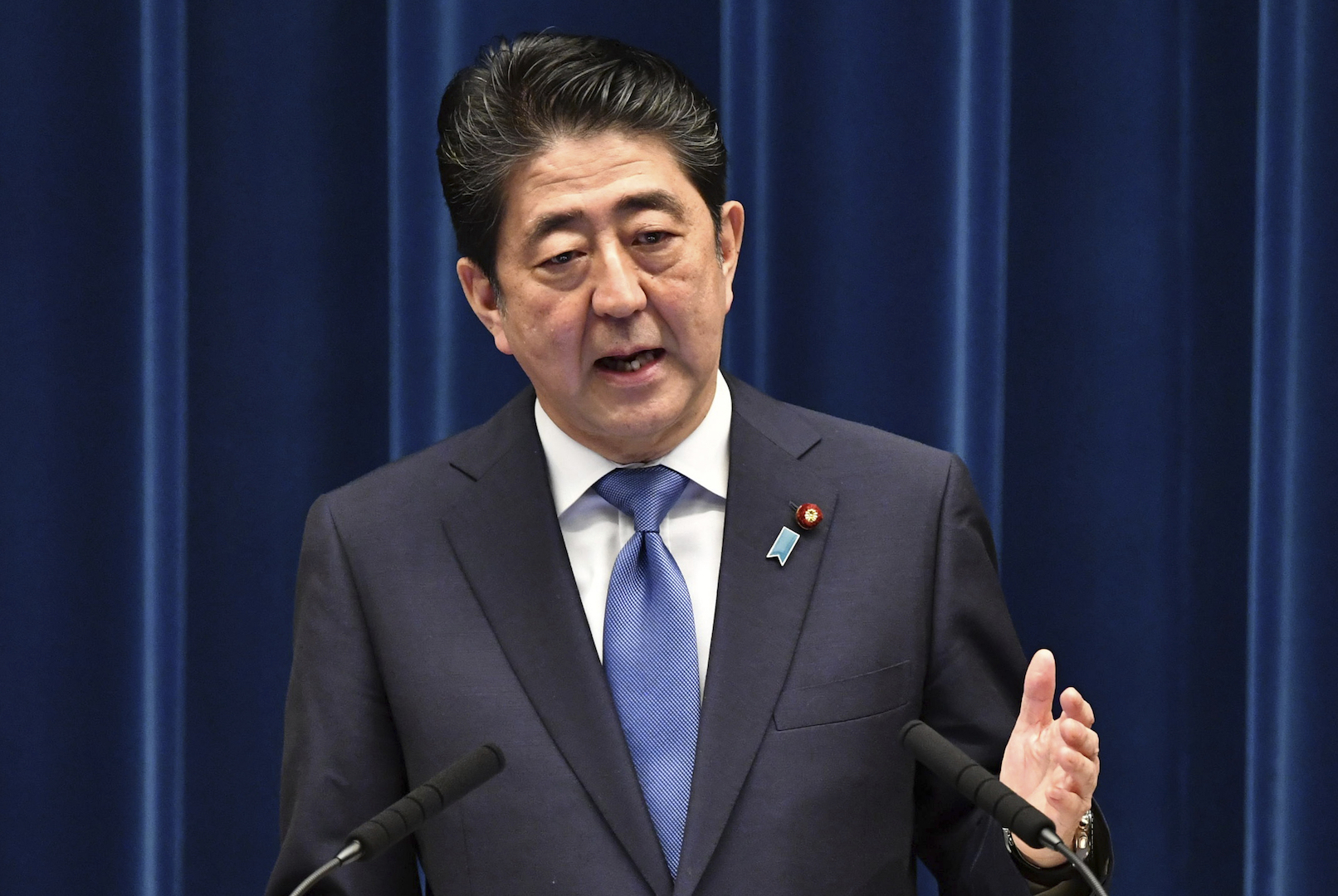 Shinzo Abe announced a snap election Monday, with the Japanese PM looking for a bigger mandate to tackle the “national crisis” of North Korea’s nuclear weapons program.But experts warn the election could backfire and leave Japan with a leadership vacuum, an echo of Theresa May’s June gamble that left the British PM and her party in a much-weaker position.Speaking in a televised address, Abe said the October 22 vote would be an assessment of his handling of the economy and the crisis on the Korean Peninsula. Tensions have escalated in recent months after Pyongyang launched two missiles that flew over Japan.Abe’s strong tone in response has seen his polling numbers rise.“Despite the seemingly favorable backdrop for Abe, there are risks in calling a snap election,” Yoel Sano, an analyst at BMI research, said. Minoru Morita, a veteran independent political analyst, told Reuters “Abe’s big gamble could yield a big surprise.”According to a weekend poll by the Nikkei business daily survey, 44 percent of voters plan to vote for Abe’s Liberal Democratic Party (LDP), compared to 8 percent for the main opposition Democratic Party. Some 20 percent of voters said they were undecided.— David GilbertRead earlier updates from the VICE News Guide to the World: Week of September 18.
Shinzo Abe announced a snap election Monday, with the Japanese PM looking for a bigger mandate to tackle the “national crisis” of North Korea’s nuclear weapons program.But experts warn the election could backfire and leave Japan with a leadership vacuum, an echo of Theresa May’s June gamble that left the British PM and her party in a much-weaker position.Speaking in a televised address, Abe said the October 22 vote would be an assessment of his handling of the economy and the crisis on the Korean Peninsula. Tensions have escalated in recent months after Pyongyang launched two missiles that flew over Japan.Abe’s strong tone in response has seen his polling numbers rise.“Despite the seemingly favorable backdrop for Abe, there are risks in calling a snap election,” Yoel Sano, an analyst at BMI research, said. Minoru Morita, a veteran independent political analyst, told Reuters “Abe’s big gamble could yield a big surprise.”According to a weekend poll by the Nikkei business daily survey, 44 percent of voters plan to vote for Abe’s Liberal Democratic Party (LDP), compared to 8 percent for the main opposition Democratic Party. Some 20 percent of voters said they were undecided.— David GilbertRead earlier updates from the VICE News Guide to the World: Week of September 18.
Yemen — September 29, 2017
UN finally greenlights investigation into Yemen war crimes

Advertisement
Myanmar — September 28, 2017
23 Rohingya women and children drown fleeing Myanmar

Advertisement
Israel — September 28, 2017
Israeli anger as Palestine receives full Interpol membership in secret vote

Advertisement
Iraq — September 26, 2017
Iraqi Kurdish leader says majority voted “yes” in referendum

Advertisement
Saudi Arabia — September 26, 2017
Saudi Arabia will finally let women drive

Advertisement
Advertisement
Ireland — September 26, 2017
Ireland’s abortion ban could come to an end in 2018

Advertisement
Mexico — September 26, 2017
Parents of Mexico’s 43 missing students take matters into their own hands

Advertisement
Brazil — September 25, 2017
Brazil won’t open up the Amazon to gold miners after all

Advertisement
Marcio Astrini, a public policy coordinator for Greenpeace Brazil, hailed the decision as “a victory of society over those who want to destroy and sell our forest,” and said it showed that no government was “absolutely immune” to pressure.Preserving the Amazon, the world’s largest rainforest, is seen as essential to efforts to combat global warming, as the trees play an important role in absorbing carbon emissions.— Tim Hume
China — September 25, 2017
China employs cutting-edge tech to disrupt WhatsApp

Advertisement
For the majority of Chinese internet users, limiting the use of WhatsApp will have little impact — most use the hugely popular WeChat for communication.But for dissidents, activists and journalists who rely on WhatsApp’s end-to-end encryption to circumvent Beijing’s surveillance apparatus, the disruption is a major blow.
WhatsApp — and its parent company Facebook — have not responded to requests for comment on the issue.The move comes three weeks out from the 19th National Congress of the Communist Party of China, a key five-yearly event on the political calendar. “As we get closer to the Party congress, I think authorities will use more extreme censorship measures.” prominent Beijing-based activist Hu Jia told AFP.—David Gilbert
Germany — September 25, 2017
Germany’s far-right party is in chaos as it eats away Merkel’s support

Advertisement
Advertisement
Japan — September 25, 2017
Japan’s snap election is ‘big gamble’ for Shinzo Abe
